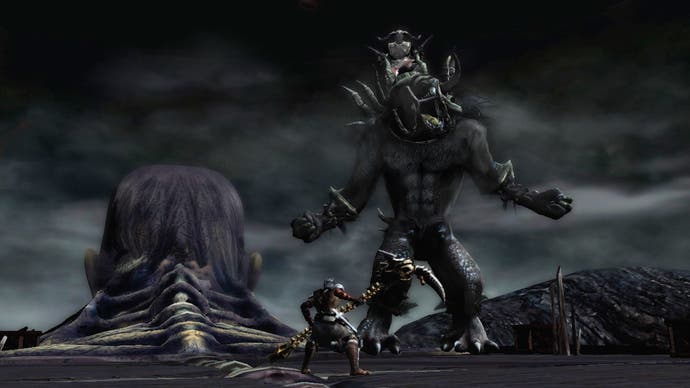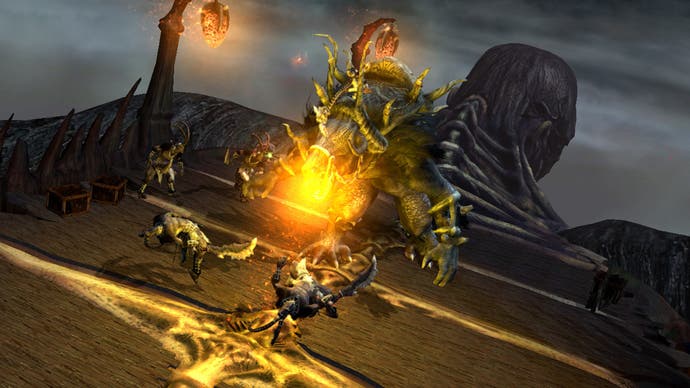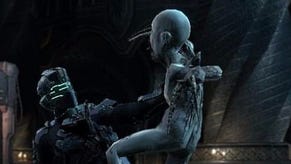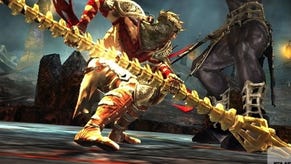Dante's Inferno
Go to Hell.
You have to wonder why it hasn't happened more often. Plenty of games have been 'inspired' by a good root around the library, but wholesale appropriation of literature has never really been the done thing. Could EA, then, not exactly known as a creative trend-setter, become just that with Dante's Inferno?
Glen Schofield, boss of EA's Dead Space-making Redwood Shores studio has got the bug. "You look around and there are some [books] that I won't mention, but you go, 'wow, I wonder whey they haven't made a game out of this before'," he tells us. "And I'm not mentioning them because I want to make games out of them. But this would be one of them. It's a great idea; it's brilliant."
We agree. Inferno, the first part of The Divine Comedy, scribbled down by Florentine poet Dante Alighieri in the early 14th Century, is as good a pitch for a videogame as you'll come across. A strong lead; a wise sidekick; a damsel in distress; a mesmerising array of enemies; nine vividly described levels; and the best end-of-game boss ever. Better than Halo.
And EA isn't the first to notice. Back in 1986, Denton Designs had a crack at the raising hell on C64. So without knowing a thing about EA's take, using today's tech to recreate Dante's journey through the nine circles of Hell is a mouth-watering proposition. Having seen it and played a chunk, it's a total no-brainer.
Over the course of the week, we'll be taking an in-depth look at the game through various features, a Eurogamer TV Show special, and a live interview with the team. (And, if you haven't seen it yet, we've got the world-exclusive first showing of the twisted new teaser trailer. But today, we're focusing on the most important bit: how it plays.

'God of War meets Dead Space' was the phrase being whispered around the Internet ahead of Inferno's official unveiling. By the time we see the game, the influence is practically screaming out. Make no mistake, this is God of War, set in Dante's Hell, made by the Dead Space team. And if that doesn't get you excited, check your pulse.
EA's is unabashed by how brazenly Inferno wears its primary game influence. Indeed, the team claims it would be "incredibly flattered" by any comparison to Sony's great action series. But it's a mark of the fellow Californian developer's confidence that it has the temerity to take on God of War at its own game, with the absolute conviction that it can beat it through a combination of Dante's narrative universe, and the talent of the team.
If you've ever played God of War, you'll know exactly where you are with Inferno. And we mean exactly. X to jump, circle to grab, heavy and light attacks mapped to triangle and square, block and special attacks on the shoulder. Sounds familiar, doesn't it? In short, it's set-piece-driven, third-person action, employing the now unmistakable blend of melee and magic attacks against enemy hordes of all shapes and sizes.
The setting for Inferno is Dante's pursuit of his beloved Beatrice through the nine circles of Hell, after she is murdered by Death and her soul dragged into the underworld. In the literature, Dante is accompanied by the Roman poet Virgil, who guides him through the gates of Hell and down towards Lucifer at its centre. As you might imagine, a 14,000-line conversation between two poets isn't quite like watching Commando on fast forward, so EA has used a little artistic licence to beef up Dante and turn him into a throbbing, thrusting action hero.

Rocking it in Crusader chic and armed with Death's own scythe (which you get after bumping off the girlfriend-killing fiend during the tutorial level), digital Dante certainly looks the part. His arsenal is completed by a Holy Cross, given to him by Beatrice, which is used mechanically for magic attacks, but we're told it also plays a crucial narrative role in the full experience.
At the global unveiling, appropriately held in Florence, we get to play through a single section of the game, level three of the game proper, just after Dante has chased Beatrice through the gates of Hell (which Knight describes as "a bit like King Kong", presumably for those of us who only ever read The Sun).










